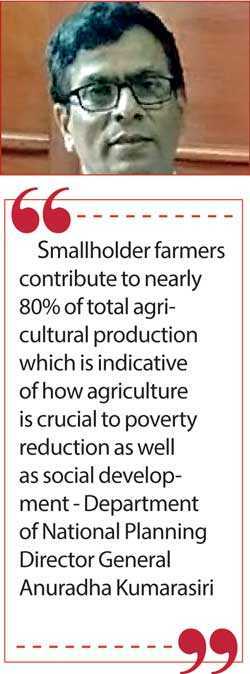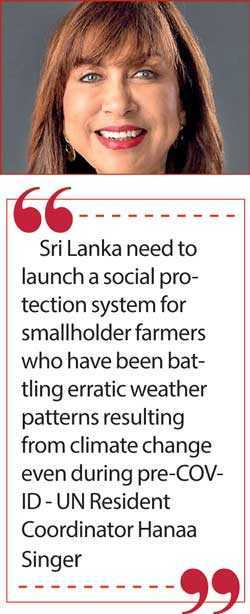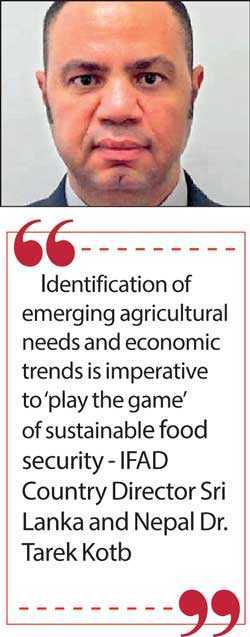Saturday Feb 28, 2026
Saturday Feb 28, 2026
Wednesday, 9 December 2020 00:00 - - {{hitsCtrl.values.hits}}
By Dishani Senaratne
 |
 |
 |
 |
While the COVID-19 pandemic is viewed as a wake-up call to address challenges faced by various actors in food supply chain, the United Nations (UN) in Sri Lanka acknowledged Government initiatives outlined in the National Policy Framework ‘Vistas of Prosperity and Splendour’ were helpful.
The UN and the Government last week conducted a virtual dialogue titled ‘Building Resilient and Sustainable Food Systems in the Age of the Pandemics,’ where key insights were shared by several experts.
The introductory session focused on the role of UN organisations on food security and value chain development insights from with the International Fund for Agriculture Development (IFAD), Food and Agriculture Organisation (FAO) and United Nations World Food Programme (WFP).
Department of National Planning Director General Anuradha Kumarasiri opined that the impact of the failure to address food system disruptions will be greater than COVID-19 implications.
“Smallholder farmers contribute to nearly 80% of total agricultural production which is indicative of how agriculture is crucial to poverty reduction as well as social development,” he pointed out.
Furthermore, he stated that the Government is committed to the full implementation of the Agenda 2030, as outlined in the Government’s National Policy Framework ‘Vistas of Prosperity and Splendour’ and the goals of the 2021 budget.
In her opening remarks, the UN Resident Coordinator Hanaa Singer stated that the pandemic has exposed how having access to safe, affordable and nutritious food has become a privilege against the backdrop of exacerbation of the Triple Burden of Malnutrition (TBM), malnutrition, undernutrition and micronutrient deficiencies.
While commending the Government for mitigating the spread of COVID-19, Singer highlighted the need to launch a social protection system for smallholder farmers who have been battling erratic weather patterns resulting from climate change even during pre-COVID.
While hailing the Government’s National Policy Framework ‘Vistas of Prosperity and Splendour’ for facilitation of food system transformation, she viewed this series of virtual dialogues as a timely initiative leading up to the 2021 UN Food Systems Summit with increased attention focused on the second Sustainable Development Goal (SDG) that aims to end all forms of hunger and malnutrition by 2030.
In the ensuing panel discussion moderated by Institute of Policy Studies Research Economist Kithmina Hewage, the role played by the UN bodies like the IFAD, FAO and WFP to ensure food chain development in Sri Lanka was brought into focus.
Reiterating that value chain is not merely about increase in production but also the importance of food delivery to the poor, the IFAD Country Director Sri Lanka and Nepal Dr. Tarek Kotb explained that lack of advice on business development and perceived risk to provide loans are some of the challenges for value chains in Sri Lanka.
“Identification of emerging agricultural needs and economic trends is imperative to ‘play the game’ of sustainable food security,” Dr. Kotb added.
Elaborating on how the IFAD continues to work with the Ministries of Plantation Industries and Agriculture to empower not only smallholder farming communities but also tea and rubber growers, Dr. Kotb called for the need of carrying out agriculture extension services such as greenhouse storage facilities with public sector support.
“It is not a matter of if but when we would face disasters,” the WFP Representative and Country Director Sri Lanka Brenda Barton reiterated, making reference to emergency preparedness amid climate change against the backdrop of damage and destruction caused by the latest cyclone Burevi.
While turning the attention to providing alternative livelihoods to farming communities who have lost their sources of income, she also revealed how the Thriposha program has been recently affected due to lack of maize.
Echoing Singer’s views, Barton said that lack of nutritional well-being of families is an invisible problem and that possibilities to connect farming communities directly with the safety net program of provision of free meals to school children are being explored. She also stressed on the role of the private sector to build resilient and robust food supply chains.
 Given that the pandemic has laid bare the fragility of contemporary food chains, digital agricultural solutions are a need of the hour, the FAO Representative for Sri Lanka and Maldives Dr. Xuebing Sun emphasised.
Given that the pandemic has laid bare the fragility of contemporary food chains, digital agricultural solutions are a need of the hour, the FAO Representative for Sri Lanka and Maldives Dr. Xuebing Sun emphasised.
Popularisation of urban agriculture to supplement traditional agriculture is vital to enhance urban food security, Dr. Sun said in response to a question.
“Although a certain level of subsidy is helpful, transforming subsidy to investment incentives should be given priority,” he said responding to another question.
The best practices and lessons learnt shared during the first virtual dialogue will be disseminated through a policy paper which would thereby enable policy makers to gain a better understanding of food security and life conditions.